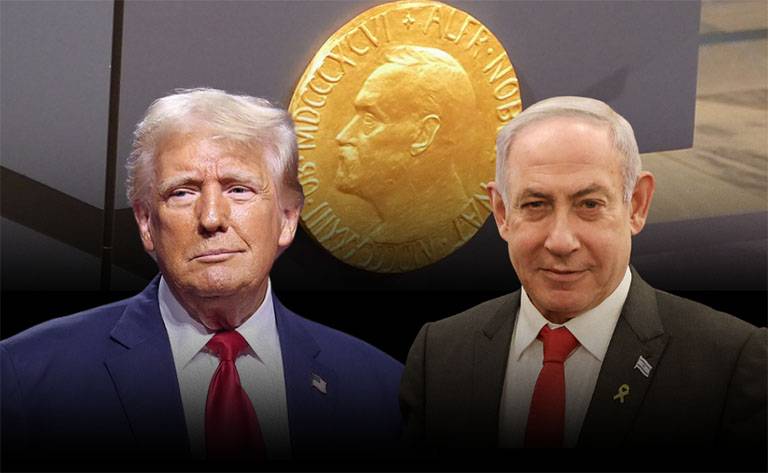674 Views
The Nobel vs. Survival: How Trump's Peace Prize Dream Clashes with Netanyahu's Political Reality
Trump views the peace process instrumentally. His goal is to showcase a major achievement to rebuild the United States' image for public opinion in the Middle East region and the global community. By emphasizing the need for a swift agreement, the U.S. President is trying to use it as a major achievement to enhance America's international standing and solidify his political legacy. In addition to promoting a "peace-seeking" image of the United States, he has used time and media pressure to accelerate the peace process.
In fact, beyond achieving an immediate result to rebuild America's image, Trump is also insistent on receiving the Nobel Peace Prize. However, Netanyahu considers the full implementation of the peace plan unattainable, and this disagreement influences the future decision-making path of the Zionist regime.
This disagreement is not merely personal or tactical; it reflects the different approaches of U.S. Middle East policy and the Israeli regime. Trump seeks a quick and symbolic result, while Netanyahu seeks a controlled, long-term process with minimal concessions. This lack of coordination causes the Israeli regime to experience internal division in its decisions and inevitably align superficially with America.
At a joint press conference in Washington D.C. on September 29, Netanyahu aligned himself with Trump, describing the plan as a joint effort that advances his government's goals while diverting international criticism of the war towards Hamas—a group that must now choose between accepting the plan or continuing the siege.
However, the Trump plan's reference to a "Palestinian state" has angered members of Netanyahu's governing coalition, considered the most right-wing government in Israel's history, where his ultra-nationalist allies, including Itamar Ben-Gvir and Bezalel Smotrich, hold significant influence.
According to an informed source, Netanyahu had tried to remove the reference to a "Palestinian state" from Trump's plan because he has repeatedly stated that the establishment of a Palestinian state will never happen.
Nevertheless, the final document does not outline a clear path towards a Palestinian state. Instead, it says: when Gaza is rebuilt and the Palestinian Authority's reform program is "fully implemented," conditions "may be ripe for a credible path towards autonomy and ultimately a Palestinian state; a goal we recognize as the aspiration of the Palestinian nation."
This diplomatic language will likely anger many of Netanyahu's right-wing allies, who had warned against any reference to a Palestinian state before his meeting with Trump. Yet, Netanyahu stood beside Trump and said this document "lays the foundation for significant progress on the path to peace in the region and beyond."
But it is said that Netanyahu does not intend to bring Trump's 20-article plan to the government for approval and will only ask ministers to vote on the conditions for the release of hostages. According to this plan, Israel will release hundreds of Palestinian prisoners in exchange for the hostages' freedom.
Alon Pinkas, a former Israeli diplomat, has also warned that Netanyahu will likely procrastinate in negotiations on vague issues, such as the army's withdrawal from Gaza, both to remain in power politically and to undermine Trump's plan from within.
Noha Gordon, an Israeli professor at Queen Mary University of London, has analyzed Netanyahu's position as follows: Netanyahu likely believes that if he has a plan for normalizing relations with more Arab and Muslim countries, he can win the next election, which must be held by October 2026. She emphasized that even after accepting Trump's plan, Netanyahu may later distance himself from it and blame Hamas—a tactic that, according to this researcher, he has used before and which might even strengthen his political position. Therefore, this seems to be an accurate analysis because Netanyahu considers accepting Trump's plan dangerous for internal stability and his conflict with his allies.
Consequently, the disagreement between Trump and Netanyahu could lead to confusion in theZionist regime's domestic policymaking, delays in strategic moves, and a weakening of internal cohesion within the regime. This rift might even lead to the resignation of some ministers or internal pressure to revise the agreement.
Finally, it must be said that these disagreements show that the Washington-Tel Aviv alliance is not necessarily monolithic, and even on seemingly common issues, it can move towards divergence influenced by the separate interests and calculations of the two sides. As a result, it seems Trump's peace plan for the Middle East will face slowness, distrust, and a growing gap between American goals and those of the Zionist regime.
Translated by Ashraf Hemmati from the original Persian article written by Hakimeh Zaim Bash
1. https://ecfr.eu/article/an-imperfect-promise-where-trumps-peace-plan-for-gaza-falls-short/?utm_source=chatgpt.com
2. https://www.al-monitor.com/originals/2025/10/analysis-netanyahu-gambles-trump-gaza-plan-may-win-back-support-abroad-risks-lurk?utm_source=chatgpt.com
3. https://www.reuters.com/world/middle-east/netanyahu-faces-far-right-backlash-trump-presses-end-gaza-war-2025-10-05/?utm_source=chatgpt.com

Comment
Post a comment for this article